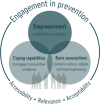Arabic-speaking male immigrants' perceptions of preventive initiatives: An interview study
- PMID: 37095730
- PMCID: PMC10349227
- DOI: 10.1111/hex.13766
Arabic-speaking male immigrants' perceptions of preventive initiatives: An interview study
Abstract
Background: Arabic-speaking men are a sparsely investigated population in health promotion and disease prevention. This may hamper their ability to achieve the highest obtainable health due to less accessibility and acceptability of preventive measures.
Aim: We explored Arabic-speaking (Palestinian, Iraqi and Somali) male immigrants' perceptions of preventive initiatives in general and such initiatives for cardiovascular diseases (CVD) in particular to understand how to address inequalities in engagement in prevention.
Methods: This qualitative study employed content analysis of semistructured interviews with 60-66-year-old Arabic-speaking men living in Denmark. Supplementary, structured data, for example, health data, were collected. From June to August 2020, 10 men were interviewed.
Findings: Preventive initiatives were found ethically and culturally acceptable alongside personally and socially relevant; they were perceived as humanitarian and caring for the participants' health, respecting of their self-determination and enabling their empowerment. Thus, the participants entreated that their fellow countrymen be assisted in achieving the prerequisite coping capabilities to address inequality in access, perceived acceptance and relevance. This led us to define one main category 'Preventive initiatives - Caring and humanitarian aid empower us' with the underlying subcategories: 'We are both hampered and strengthened by our basic assumptions' and 'We need help to achieve coping capabilities enabling us to engage in preventive initiatives'.
Conclusion: Prevention was perceived as acceptable and relevant. Even so, Arabic-speaking men may be a hard-to-reach group due to their basic assumptions and impaired capabilities for engaging in prevention. Addressing inequality in accessibility, acceptability and relevance in regard to prevention may be promoted through a person-centred approach embracing invitees' preferences, needs and values; and by strengthening invitees' health literacy through efforts at the structural, health professional and individual levels.
Public contribution: This study was based on interviews. The interviewees were recruited as public representatives to assist us in building an understanding of Arabic-speaking male immigrants' perceptions of preventive initiatives in general and preventive initiatives for CVD in particular.
Keywords: cardiovascular disease; healthcare disparities; immigrants; men; prevention; public involvement; screening.
© 2023 The Authors. Health Expectations published by John Wiley & Sons Ltd.
Conflict of interest statement
The authors declare no conflict of interest.
Figures
Similar articles
-
Facilitating participation in cardiovascular preventive initiatives among people with diabetes: a qualitative study.BMC Public Health. 2021 Jan 22;21(1):203. doi: 10.1186/s12889-021-10172-6. BMC Public Health. 2021. PMID: 33482775 Free PMC article.
-
Exploring the Health Care Challenges and Health Care Needs of Arabic-Speaking Immigrants with Cardiovascular Disease in Australia.Pharmacy (Basel). 2019 Nov 11;7(4):151. doi: 10.3390/pharmacy7040151. Pharmacy (Basel). 2019. PMID: 31717927 Free PMC article.
-
Barriers and enablers to accessing child health resources and services: Findings from qualitative interviews with Arabic and Mongolian immigrant mothers in Australia.Womens Health (Lond). 2024 Jan-Dec;20:17455057241242674. doi: 10.1177/17455057241242674. Womens Health (Lond). 2024. PMID: 38561970 Free PMC article.
-
Barriers and enablers to healthcare access and use among Arabic-speaking and Caucasian English-speaking patients with type 2 diabetes mellitus: a qualitative comparative study.BMJ Open. 2015 Nov 17;5(11):e008687. doi: 10.1136/bmjopen-2015-008687. BMJ Open. 2015. PMID: 26576809 Free PMC article. Review.
-
Systematic review: Self-rated health of Arab immigrants in the United States.Public Health Nurs. 2019 Sep;36(5):623-630. doi: 10.1111/phn.12640. Epub 2019 Jul 15. Public Health Nurs. 2019. PMID: 31304997
Cited by
-
Stakeholders' perceptions and experiences of factors influencing the commissioning, delivery, and uptake of general health checks: a qualitative evidence synthesis.Cochrane Database Syst Rev. 2025 Mar 20;3(3):CD014796. doi: 10.1002/14651858.CD014796.pub2. Cochrane Database Syst Rev. 2025. PMID: 40110911
References
-
- World Health Organization . Noncommunicable Diseases. World Health Organization; 2021. https://www.who.int/news-room/fact-sheets/detail/noncommunicable-diseases
-
- World Health Organization . Health Promotion Glossary of Terms 2021. 1st ed. World Health Organization; 2021.
-
- World Health Organization . Human Rights and Health. World Health Organization; 2017. https://www.who.int/news-room/fact-sheets/detail/human-rights-and-health
-
- Committee on Economic, Social, and Cultural Rights (CESCR). General Comment No. 14: the right to the highest attainable standard of health (article 12 of the International Covenant on Economic, Social and Cultural Rights); 2000.
MeSH terms
Grants and funding
LinkOut - more resources
Full Text Sources



